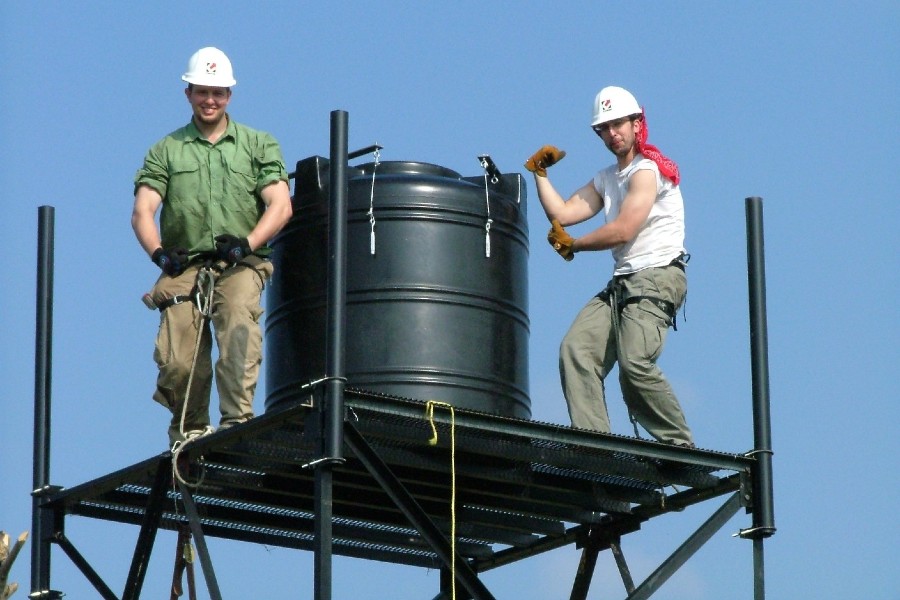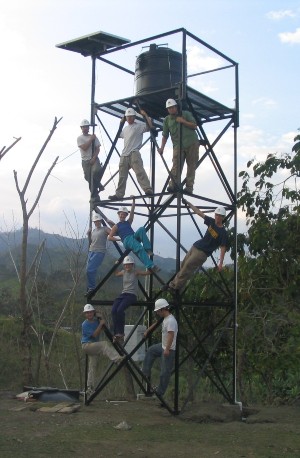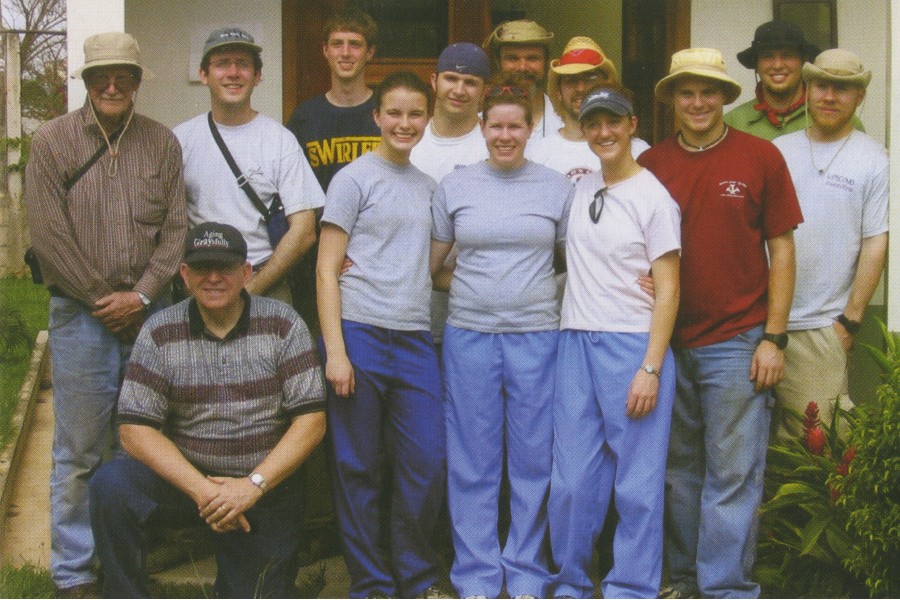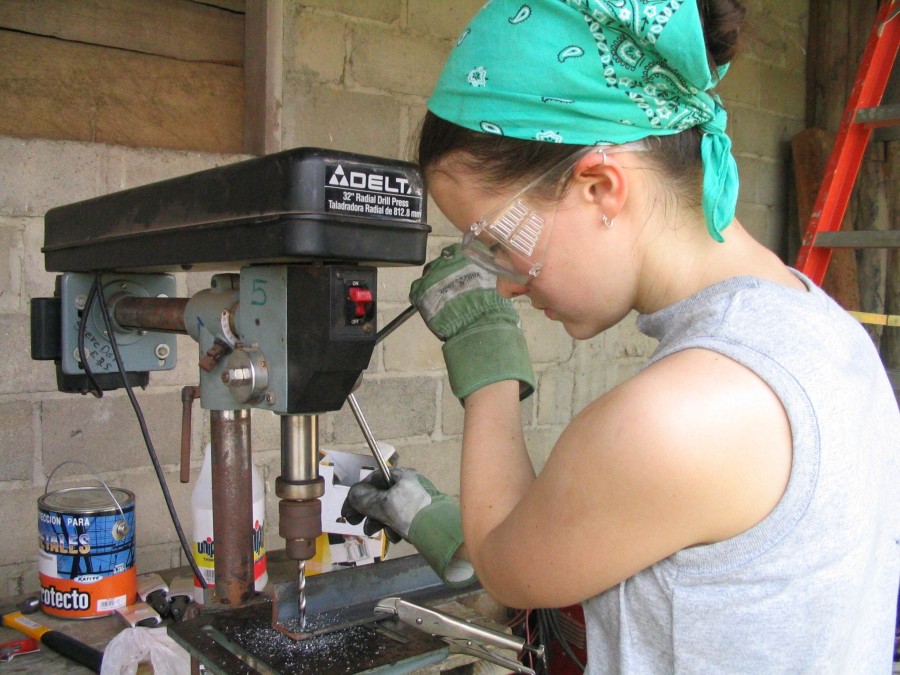20 years of missions: Where are the pioneers now?
Engineering students who pioneered the first engineering-focused mission project at Lipscomb have gone on to lead other projects for our society as well as building their own futures and families.
Janel Shoun-Smith |

See more memories and current details of each 2004 mission team member.
See more on 20 years of engineering missions at Lipscomb
In 2004, nine engineering students pioneered the first engineering-focused mission project at Lipscomb. Twenty years later, Lipscomb has gone on to establish the Raymond B. Jones College of Engineering, and those students have gone on to lead other crucial projects for our society as well as building their own futures and families.
Twelve Lipscomb Bisons traveled the rural Honduran community of Las Delicias, which serves as home base of operations for Mission Predisan, a Christian medical outreach organization that used the site as a basecamp for roving health professionals to hold clinic days in even more remote areas in the surrounding mountains.

las Delicias, Honduras, site of the first mission trip to build a water tower
The team brought everything they needed with them to construct—in just four days—the 20-foot water tower and tank equipped with a solar-powered pump. The tower, intended to provide a reliable water source in a community with no electricity, had been designed by students and faculty in Lipscomb’s structural design course taught by Fort Gwinn, then chair of the engineering mechanics department.
They all have precious memories from the 2004 trip, but the one memory mentioned most often by the original participants was the smell of bacon.
As told by several of the alums, upon arriving at the Honduras airport, the engineer’s cutting oil, to be used for lubrication as they drilled holes in the steel to assemble the tower, was confiscated by airport officials. In one of many innovative ideas he shared on that first trip, and many thereafter, alumnus Lee Whitney (A ’54) said they could use pig lard. They bought some at a local market and every time they drilled holes it smelled like bacon.
According to the alumni, the first night they left the lard out in the open and wild animals ate almost all of it. Then not only did the team have to buy more lard, but the animals spent the day laying around the construction site sick to their stomachs.
Whitney, now deceased, continued to attend Lipscomb engineering trips and endeared himself to engineering students for several years, said Gwinn, now retired associate dean of the engineering college, who began leading engineering mission projects in 2005. In 2006, when Lipscomb engineers arrived in Chicacao, Guatemala, to find that the platforms built by the locals for a new swinging footbridge were not the right dimensions, Whitney figured out a way to way on-site to make the project still work, said Gwinn.
“Lee is by far one of the best design engineers that I have ever known,” said Gwinn. “He had the ability to see how every aspect of a project fits together. He was one of those rare individuals who can see how the tiniest detail fits into the overall project. Lee was a tremendous example for me, both as an engineer and as a Christian.”
Read on for more first-person memories from the other participants of the first 2004 trip and to find out where they are working and living now.

The first project in Las Delicias, Honduras, provided a consistent water supply for Mission Predisan.
- David Fann
- Fred Gilliam
- Kristopher Hatchell (BS ’06)
- Chad Jacobs (BS’04)
- Kathryn (McDonald) Kornrumpf (BS ’05)
- Amy (Gilfilen) Lucas (BS ’07)
- Matthew Lucas (BS ’07)
- Kirk Pippin (BS ’07)
- Karla (Childress) Rodkey (BS ’05)
- James Savage (BS ’04)
- Matt Sheppard (BS ’04)
- Lee Whitney (A ’54), deceased

Members of the original 2004 Team (not in order): Fred Gilliam, Kristopher Hatchell, Chad Jacobs, Kathryn (McDonald) Kornrumpf, Amy (Gilfilen) Lucas, Matthew Lucas, Kirk Pippin, Karla (Childress) Rodkey, James Savage, Matt Sheppard and Lee Whitney.
David Fann
Senior Principal Architect, Digital Patient Experience, HCA Healthcare
Fann has continued to be involved in engineering missions over the years, with his last participation in 2019.
“Some students had never been out of the country before. Some had never seen creation in the way you see it on a trip like this. To see that God is a big God, to see how God is moving in the world and how they can use their skills for God. That is creating a passion for missions.”
Fred Gilliam
Dean Emeritus of the Raymond B. Jones College of Engineering
At the time of the trip, Gilliam was the founding associate dean of the School of Engineering. He later became the dean of the college in 2009. Today he is retired and living in Sparta, close to Burgess Falls.

Kris Hatchell (center), with Fred Gilliam (r) and Lee Whitney (l).
Kristopher Hatchell (BS ’06)
Master’s in engineering from Mississippi State University
Hatchell served as Lipscomb’s on-site coordinator of projects in the Ulpan Valley, Guatemala, for two years and then as a missions coordinator at Lipscomb for three years before joining Barge Design Solutions as a project engineer in Knoxville where he worked on the expansion of the Loudon Utilities Water Treatment Plant from 14 to 32 million gallons per day. He also serves on the board for KnoxProCorp, a not-for-profit organization focused on mobilization of Knoxville professionals to use their gift to serve developing communities.
“I remember working hand-in-hand with Dr.[Fred] Gilliam on the housing for our solar pump and seeing water get pumped for the first time… It taught me that with most projects, it is not all about the outcomes of the project but rather the relationships with the people you worked with on the project.”
“It changed everything. It showed me that I could use the gifts that God had given me in engineering to serve him across the globe. The entire experience changed the trajectory of my life. Looking back was such a pivotal moment for me, my academic career and ultimately my professional career.”
Chad Jacobs (BS’04)
Jacobs is a mechanical engineer at Jacobs in Manchester.
Kathryn (McDonald) Kornrumpf (BS ’05)
Kornrumpf worked as an R&D engineer at Cook Endoscopy until becoming a stay-at-home mom of three kids with husband Brian Kornrumpf (BS ’05) in Charlotte, N.C.

Amy (Gilfilen) Lucas (BS ’07) working on a drill on the first mission trip in 2004. The cutting oil the team brought with them got confiscated at the airport, so alumnus Lee Whitney came up with the idea to use pig lard bought at the market.
Amy (Gilfilen) Lucas (BS ’07)
Master’s in aerospace engineering from Texas A&M University
Lucas was a data analyst for defense contractor Parsons, in Huntsville, Ala., before becoming a stay-at-home mom for her five children with husband Matthew Lucas, also a member of the inaugural engineering mission trip. Amy Lucas runs the family far in Kelso, Tennessee,
“I remember eating beans and rice every meal and taking bucket showers. It was a wonderful trip because I was a freshman on the trip with seniors. We all worked together to build it. Getting to know the professors better was great. When we went back the following year for another project, it was amazing to see the water tower in use.”
Matthew Lucas (BS ’07)
Master’s in mechanical engineering from Texas A&M University
Lucas is the ATEC Standardization Lead at White Sands Missile Range and has worked at the U.S. Army Redstone Test Center.
Kirk Pippin (BS ’07)
Master’s in business administration and management from the University of Phoenix.
He is a mechanical engineer for the Tennessee Valley Authority living in Decatur, Alabama.
Karla (Childress) Rodkey (BS ’05)
Graduate degree in aerospace engineering from Purdue University
Rodkey worked with Jacobs Technology as a CFD engineer and helped analyze parts of the James Webb Space Telescope for NASA. She also worked as an application support engineer for STAR-CCM+ before becoming a stay-at-home mom in McGregor, Texas.
“We took a bucket bath and washed our hair out of a five-gallon bucket. I remember learning how to wash our clothes on the concrete washboard they had for laundry, and once we had the tower erected, climbing to the top to look out into the mountains, I remember how excited we were to build have something!”“The project really opened my eyes to how the skills we had been given as engineers could really benefit the lives of people around the world.”

James Savage (BS ’04)
Chief Engineer Exploration Upper Stage at Boeing
Savage has worked at Boeing in Madison, Alabama, since his graduation, working in the “Stages” Team of the Space Launch System to design, build and fly a Saturn V class Manned Launch Vehicle for NASA's Exploration Mission.
Matt Sheppard (BS ’04)
Shepperd is a program manager at Upwork in Nashville.
He manages cross functional programs and projects for the accounting and finance department.
“It was the best way to bring together all that I had learned during my time at Lipscomb. I was able to serve people by using my education. Personally it tied everything together. I got more than just an engineering education at Lipscomb, I learned how to not only think like a engineer, but how to use my gifts to help others.”
Lee Whitney (A ’54), deceased
Formerly of Tullahoma, Whitney was an alumnus in 2004. He had trained under experienced engineers and completed correspondence courses to teach himself the skills needed. Whitney participated in three more engineering mission trips after the inaugural trip. Before his death in 2012, he created an engineering scholarship to support Lipscomb engineering students interested in mission opportunities.